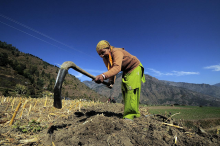
Some 175 countries signed the Paris climate agreement at UN headquarters on Friday in a ceremony timed to coincide with Earth Day. The agreement was adopted in Paris last December by the 196 Parties to the UN Framework Convention on Climate Change (UNFCCC) at the COP21 conference. Its objective is to limit global temperature rise to well below 2 degrees Celsius and to strive to keep it below 1.5 degrees. The treaty will enter into force thirty days after at least 55 countries, accounting for 55% of global greenhouse gas emissions, have ratified it. On the occasion of the signing ceremony, the United Nations Food and Agriculture Organisation (FAO) stressed the crucial role agriculture, in addition to reducing poverty and hunger, can play in responding to climate change. Agriculture can help reduce the impact of climate change, thus fostering resilience among communities, Maria-Helena Semedo, FAO Deputy Director-General for Natural Resources said in New York. She highlighted that agriculture is also one of the main sectors of the economy that is severely affected by climate change as the recent El Niño phenomenon has clearly demonstrated. Particularly the rural poor and small holder farmers are severely affected by climate change threats, Semedo said. While the Paris agreement recognises “the fundamental priority of safeguarding food security and ending hunger, and the particular vulnerabilities of food production systems to the impacts of climate change”, the texts does not mention the contribution of agriculture to greenhouse gas emissions as well as its potential to reduce emissions. IFOAM – Organics International, the worldwide umbrella organisation for the organic agriculture movement, highlighted the role of industrial farming as a key source of emissions. In a press release, IFOAM said endeavors to limit global warming will be futile if the world does not switch to climate-friendly agroecological farming practices. “Time is up for business as usual,” said Gábor Figeczky, Advocacy Manager at IFOAM, “transitioning to organic agriculture is necessary to slash emissions from food production, safeguard ecosystems and protect the earth.” Agriculture and forest-related mitigation actions in the land sector could contribute to food security and tackle activities such as the use of harmful inputs that degrade soils, destroy ecosystems and exacerbate climate change. According to IFOAM, organic farming techniques need to be adopted that capture carbon in the soil, nourish ecosystems and reduce emissions to protect the earth and try to keep global warming below 1.5°C. To this end, farmers need to be equipped with the agroecological knowledge. “Failure to pursue actions in accordance with social and ecological considerations will have devastating impacts on farmers and food production, and could push millions into poverty,” Figeczky said. (ab)
- The Guardian: World governments vow to end fossil fuel era at UN climate signing ceremony
- FAO News: To fight climate change, invest in agriculture
- UN News Centre: ‘Today is an historic day,’ says Ban, as 175 countries sign Paris climate accord
- IFOAM: Let’s Grow Food, Fight Climate Change, Protect the Earth
